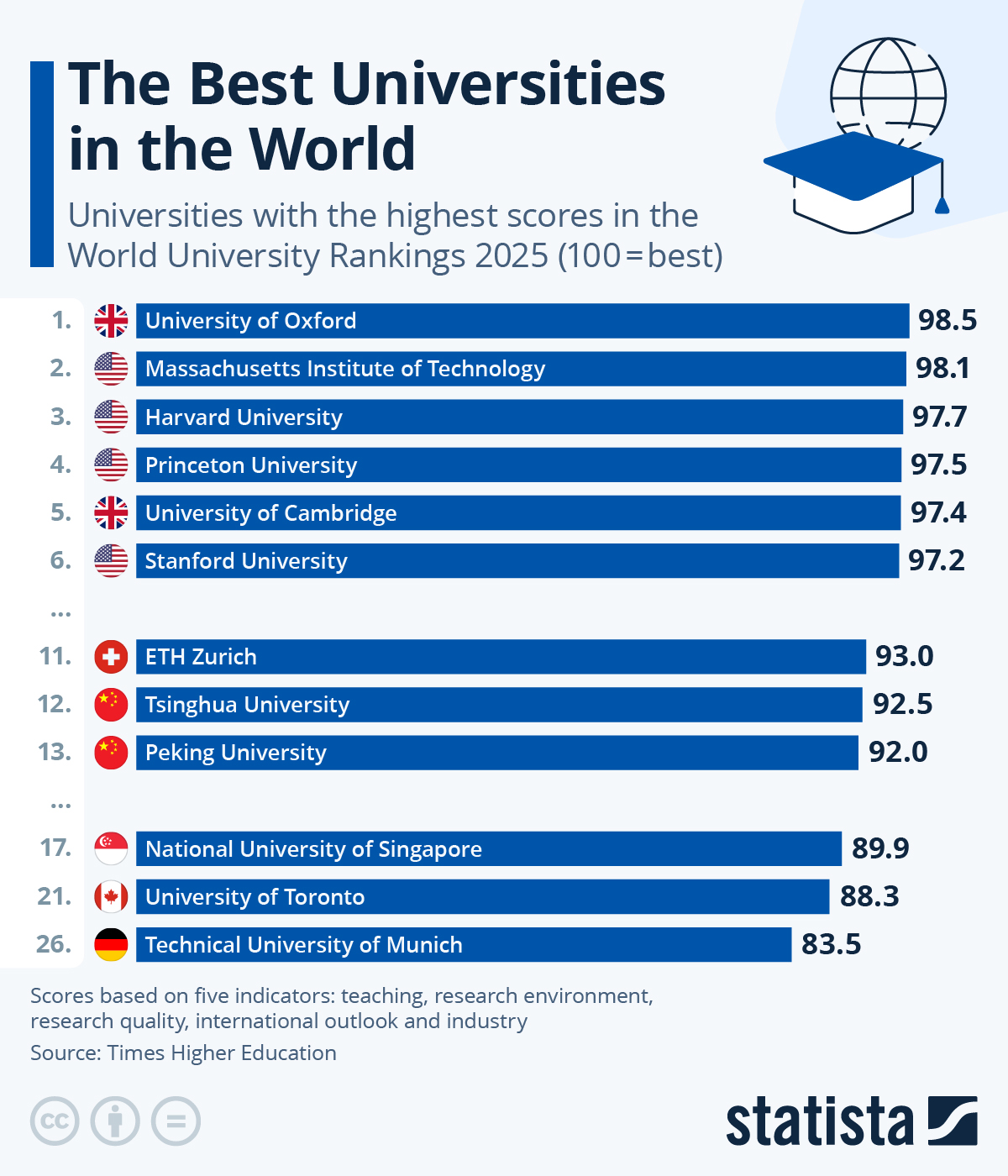Chinese universities are taking a quality over quantity approach that is quickly enabling them to catch up with the US Ivy League, analysts say.
While British and American universities still dominate, the likes of Tsinghua University and Peking University have ranked among the top higher education institutions in Asia and the world.
Both outranked Ivy League universities such as Columbia University, Cornell University and University of Pennsylvania in the Times Higher Education 2024 World University Rankings, published in September.
And, after The Times Higher Education 2024 released its Asia rankings this week, Tsinghua has retained its position as top in the region for the sixth year in a row, while Peking kept its second position for the fifth year running.
“We have tracked the impressive rise of China in the global rankings for two decades now, but what we can clearly see now is that the rising tide in Asia is lifting all boats," said Phil Baty, Times Higher Education’s chief global affairs officer.
“While China’s leading universities now compete at the very top of the world rankings, our data shows a strengthening across Asia, where a healthy competition, more collaboration, more investment in research and university capacity and more internationalisation is driving up performance.
"It all amounts to hugely positive tectonic shifts in higher education from the West to the East, with real excellence demonstrated in East Asia and South-East Asia in particular and well beyond."
Five out of top 10 universities in Asia are in China
China’s representation in the top 10 has increased to five, up from four last year. This has come at the expense of universities from Hong Kong, which now has two institutions in the top 10, compared to three last year.
Singapore has two universities in the ranking: National University of Singapore, which is third and Nanyang Technological University, which moved up one place from fifth to fourth this year.
The University of Tokyo moved from eighth last year to fifth this year and Kyoto University from 18th last year to 13th.
The University of Hong Kong ranked sixth while Shanghai Jiao Tong University ranked seventh.
Fudan University took the eighth position worldwide and Zhejiang University the ninth spot, while The Chinese University of Hong Kong took the 10th spot in Asia.
Seventeen of Thailand’s 19 universities either moved up or maintained their position in this year’s ranking.
“Another significant highlight is the growth of other regional powerhouses including India, Japan and increasingly Thailand, all of which show a continuous improvement in Asian countries’ higher education systems, which must be seen against the backdrop of an increasingly highly competitive higher education environment in the region," said Mr Baty.
Chinese universities reject western blueprint
Senthil Nathan, managing director and co-founder of Edu Alliance, a higher education consultancy based in the UAE and the US, said Tsinghua University and Peking University had climbed the ranks in the past 12 years to reach the top.
"Tsinghua University and Peking University have only about 14 to 18 per cent international students, while other similarly ranked universities such as ETH Zurich has 35 per cent international students and Chicago University has 24 per cent international students," said Mr Nathan.
“These Chinese universities are selecting the best Chinese students. That’s a huge difference. They are not following the western blueprint.
"They are not attracting the best and the brightest from the world, but from within their country because they have enough resources.
“The good thing about what is happening in China is that they are focusing not on quantity (of research), but on quality and that is actually paying dividends.
“Their research quality has been going up. At Tsinghua University, their research quality went up from being ranked 71 worldwide to 12 in the past 12 years."
Mr Nathan said these were producing lots of high-quality papers that lead to patents and innovation, which is a big contribution to their improved ranking.
The strategy of the top Chinese universities was to focus on the newer areas of research related to artificial intelligence and big data, he added.
China's transformed research landscape
Duncan Ross, chief data officer at Times Higher Education, said the quality and quantity of Chinese research overtook that of the US in 2022 after targeted investment in high-end research institutions.
“The Chinese government invested significantly in those universities, so you've had a series of Chinese financing initiatives that have been put in place to support higher education, not just at the national level, but also at the regional and city level," said Mr Ross.
“This has resulted in a transformation of the research part of their higher education system.
“There was a point in time a few years ago, when the volume of Chinese research overtook the volume of US research for the first time. If you look at the quality, the average quality of Chinese research has also overtaken the average quality of US research.
“It's not that US universities have got worse in any way. They are improving, but the universities from Asia and some of these top universities in China or the National University of Singapore are just improving more quickly.
"The fact is that we are further ahead than we've ever been. Universities are getting better overall and that's got to be a good thing for the world.”
UAE has four universities in the top 100
Khalifa University has jumped five slots to be ranked top in the UAE and 40th in Asia in The Times Higher Education Asia University Rankings 2024.
UAE University ranked 58th worldwide, a drop from 40th position last year, Abu Dhabi University ranked 89th, down from 59th position last year, and The University of Sharjah also dropped from 45th position to 96th spot worldwide this year.
Times Higher Education has introduced significant changes to the original methodology this year to ensure that the rankings continued to reflect the outputs of a diverse range of research-intensive universities.
The rankings evaluated 739 universities from 31 countries or territories, using indicators such as teaching, research quality, research environment, international outlook and industry.
"There are some aspects of UAE's ranking where you are doing exceptionally well, you can't improve because you're right at the top such as in terms of international activity, the number of international students and the number of international collaborations the country has with other universities," Mr Ross said.
"The area where we've seen the biggest growth in performance in UAE is around research quality."

















